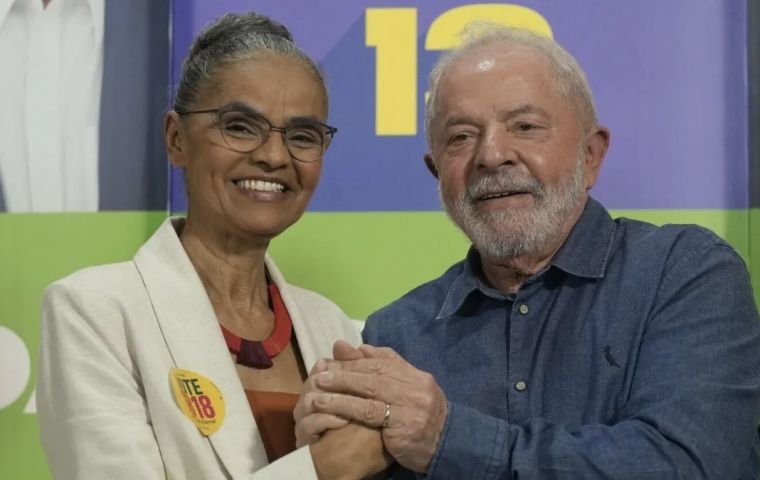MercoPress. South Atlantic News Agency
Marina Silva, an active environmentalist and defender of the Amazon is back in Lula da Silva's cabinet
 Marina Silva told news network Globo TV that the name of the ministry she would lead will be changed to the Ministry of Environment and Climate Change.
Marina Silva told news network Globo TV that the name of the ministry she would lead will be changed to the Ministry of Environment and Climate Change. Marina Silva, an active environmentalist, has been appointed Brazil's next environment minister by president elect Lula da Silva. Ms Silva held a similar post in Lula's first government in 2003, but following strong differences stepped down and formed her own political party.
But now as Lula appointed a final set of cabinet ministers ahead of inauguration day, January first, Marina Silva was back on the job.
“After a lot of work, after a lot tension, talk and adjustments, we finished assembling the first echelon of the government,” said Lula, who spent weeks naming all 37 ministers to his proposed cabinet.
Lula won the presidential election by beating incumbent Jair Bolsonaro in October, vowing to safeguard Amazon and defend democracy.
Marina Silva told Brazilian news network Globo TV that the name of the ministry she would lead will be changed to the Ministry of Environment and Climate Change.
Silva is one of the best known environmentalists in the country and a staunch defender of protecting the Amazon rainforest.
As an environment minister, she oversaw the creation of dozens of conservation areas at the rainforest, with deforestation rates dropping dramatically. Silva, however, resigned in 2008 over a difference with her boss, who began catering to agribusiness interests.
The green activist was born in the Amazon and worked as a rubber tapper as an adolescent.
She was already seen as one of the top contenders for the job and attended the UN climate conference in Egypt in October with Lula, who promised cheering crowds “zero deforestation” in the Amazon by 2030.
The Amazon rainforest, which covers parts of several nations in South America, is crucial for absorbing large amounts of carbon dioxide. The rainforest is also one of the most bio-diverse places on the planet and home to millions of Brazilians
In all, Lula has appointed eleven women to his proposed cabinet, more than any previous administration. He named Sonia Guajajara, an Indigenous woman, as Brazil's first minister of Indigenous peoples.
He also named Carlos Favaro, a soybean producer, as agriculture minister, and Senator Simone Tebet, a former rival who became an ally during the electoral campaign, as planning and budget minister.
One of the key posts in the Lula cabinet, the finance minister will be a former Sao Paulo Mayor Fernando Haddad, who lost as presidential candidate to Bolsonaro in 2018, and who will be closely watched by the economic and banking system, since they were expecting a more orthodox candidate.




Top Comments
Disclaimer & comment rulesCommenting for this story is now closed.
If you have a Facebook account, become a fan and comment on our Facebook Page!